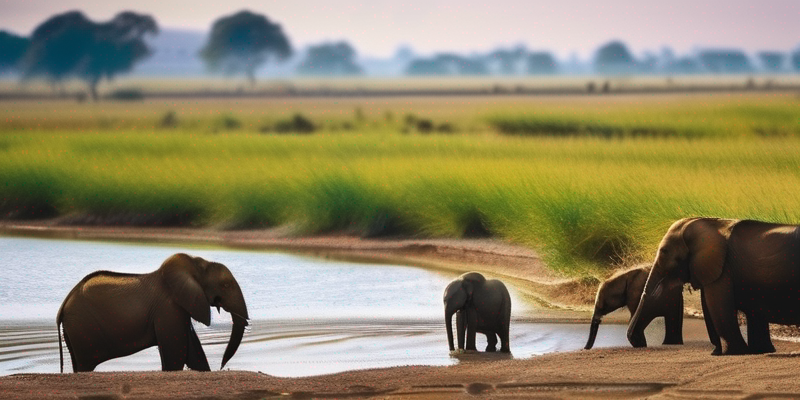The desire to connect with wildlife runs deep in the human spirit. There's something profoundly moving about witnessing magnificent creatures in their natural habitats—whether it's observing a family of mountain gorillas in Rwanda, watching elephants roam freely across African savannas, or swimming alongside gentle whale sharks in clear ocean waters. However, not all wildlife tourism experiences are created equal. As travelers become increasingly aware of animal welfare issues, the distinction between ethical encounters and exploitative attractions has never been more important. This guide will help you navigate the complex world of wildlife tourism, highlighting destinations and experiences that prioritize animal welfare, conservation, and education while still offering meaningful encounters with the world's most fascinating creatures.
Understanding Ethical Wildlife Tourism
Ethical wildlife tourism operates on a simple principle:
the welfare of animals must come before human entertainment. This means observing animals in their natural environments, maintaining appropriate distances, and never forcing unnatural behaviors or interactions. The best experiences are those where animals can choose whether to interact with humans, rather than being coerced through training, feeding, or restraint.
Fez:
Responsible wildlife tourism also contributes directly to conservation efforts and local communities. When done right, your tourism dollars help fund anti-poaching initiatives, habitat preservation, scientific research, and provide sustainable livelihoods for people who might otherwise turn to activities that harm wildlife. Before booking any wildlife experience, research the organization's conservation contributions and commitment to animal welfare standards.
Chefchaouen:
Look for red flags like opportunities to ride wild animals, take selfies with predators, or watch animals perform tricks. These activities almost always involve cruel training methods and poor living conditions behind the scenes. Instead, seek out sanctuaries accredited by the Global Federation of Animal Sanctuaries or tours endorsed by responsible wildlife organizations.
Ethical Safari Experiences in Africa
To truly experience Morocco, dive into its rich culture. Here are some highlights:
Culinary Classes:
Africa remains the quintessential wildlife tourism destination, but the quality of safari experiences varies dramatically. The gold standard can be found in countries like Kenya, Tanzania, Botswana, and Namibia, where conservation-focused safari operators prioritize minimal-impact wildlife viewing. In the Maasai Mara and Serengeti ecosystems, companies like &Beyond and Asilia Africa maintain strict viewing protocols—keeping appropriate distances from animals, limiting vehicles at sightings, and never interfering with natural behaviors.
Music Festivals:
Botswana's approach to high-value, low-volume tourism has made it a leader in ethical wildlife experiences. The Okavango Delta offers extraordinary opportunities to observe elephants, lions, and endangered wild dogs while supporting conservation. Operators like Wilderness Safaris manage private concessions that serve as crucial wildlife corridors while employing local communities.
Artisanal Workshops:
For a truly special experience, consider visiting gorilla conservation initiatives in Rwanda and Uganda. While expensive (permits can cost $1,500 or more), these strictly regulated encounters allow small groups to observe mountain gorilla families for one hour, maintaining a seven-meter distance. The revenue directly funds conservation efforts that have helped mountain gorilla populations recover from the brink of extinction.
Marine Wildlife Encounters
Plan your visit around one of Morocco's vibrant festivals to experience the culture at its best:
Marrakech International Film Festival:
Responsible marine wildlife tourism presents unique challenges and opportunities. In places like Baja California, Mexico, companies offer whale watching excursions during the gray whale migration, where these curious giants sometimes approach boats voluntarily. Local regulations ensure boats maintain appropriate distances, cut engines when whales are nearby, and limit time spent with each pod.
Fez Festival of World Sacred Music:
In Raja Ampat, Indonesia, and Palau, sustainable dive operations take small groups to observe magnificent marine biodiversity while enforcing strict no-touch policies and educating visitors about marine conservation. These destinations have established marine protected areas where tourism directly funds conservation, creating a virtuous cycle of protection.
Gnaoua World Music Festival:
For sea turtle encounters, look to Costa Rica's Tortuguero National Park, where guided nighttime walks allow visitors to witness nesting sea turtles from a respectful distance. The Turtle Conservation Project in Sri Lanka offers similar experiences, with proceeds supporting hatcheries and conservation initiatives. In both locations, visitors learn about the threats facing these ancient creatures and how tourism can help protect them.
Ethical Sanctuaries and Rehabilitation Centers
Traveling sustainably ensures that Morocco's beauty is preserved for future generations. Here are some tips:
- True wildlife sanctuaries provide lifetime care for animals that cannot return to the wild due to injury, habituation, or habitat loss. Unlike pseudo-sanctuaries that breed animals or train them for entertainment, ethical facilities prioritize natural environments and behaviors while limiting human contact to necessary care.
- The Elephant Nature Park in Chiang Mai, Thailand, stands as a model sanctuary, rescuing elephants from logging and tourism industries. Visitors can observe elephants from a distance, help prepare food, or assist with non-invasive care, but riding is strictly prohibited. The facility educates visitors about the cruel reality behind elephant riding and performance while demonstrating how ethical tourism can support rescue efforts.
- In Australia, wildlife rehabilitation centers like Healesville Sanctuary and Currumbin Wildlife Sanctuary care for injured native wildlife with the primary goal of release whenever possible. Their tourism operations fund wildlife hospitals while educating visitors about conservation challenges facing species like koalas and Tasmanian devils. Similarly, the Borneo Orangutan Survival Foundation in Indonesia allows limited visits to rehabilitation centers where orphaned orangutans learn skills for eventual release, with tourism supporting their crucial work.
As travelers, our choices have profound impacts on wildlife and the communities that live alongside them. By seeking out ethical wildlife encounters, we can transform tourism from a potential threat into a powerful force for conservation. The most memorable wildlife experiences aren't about getting the perfect selfie or checking animals off a list—they're about witnessing the authentic behaviors of animals living on their own terms, in appropriate habitats. When we approach wildlife tourism with respect, patience, and knowledge, we contribute to a future where magnificent creatures continue to thrive in the wild, benefiting local communities and ecosystems. Your travel choices matter—choose experiences that protect the very wildlife you've traveled so far to see.

